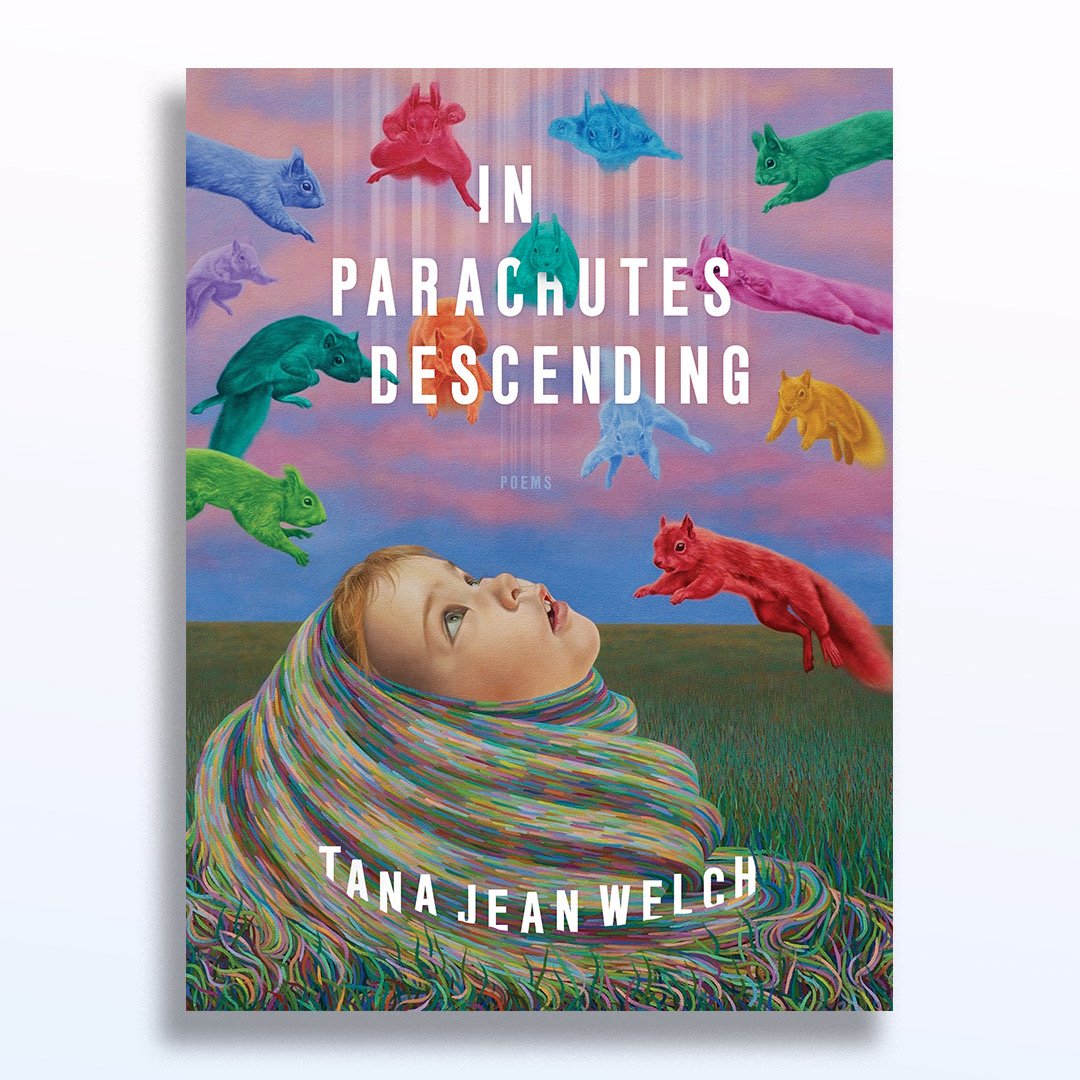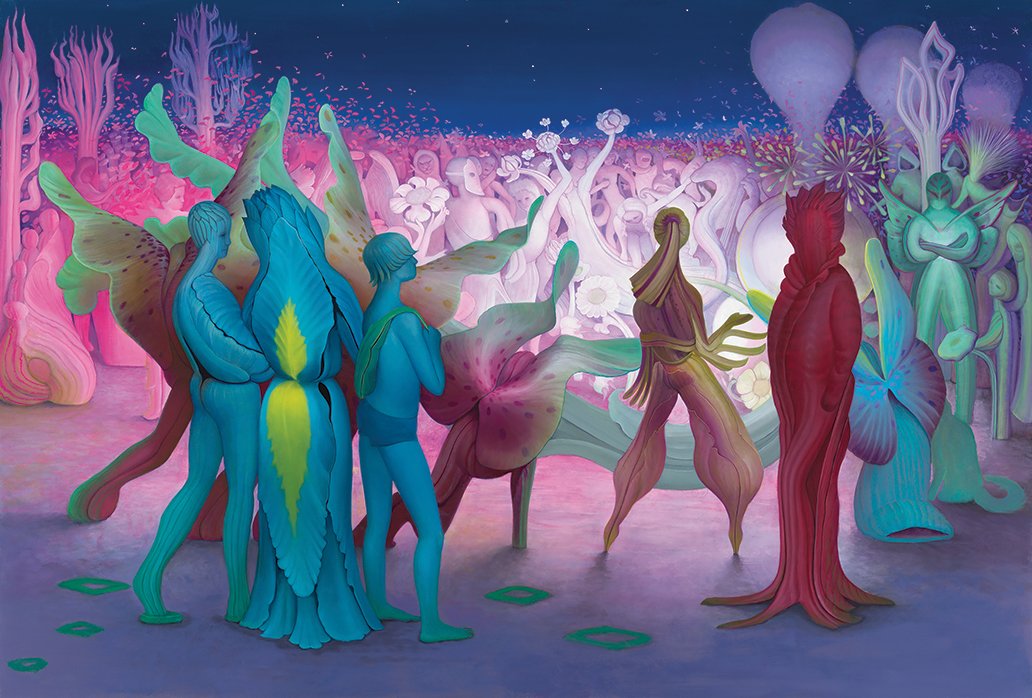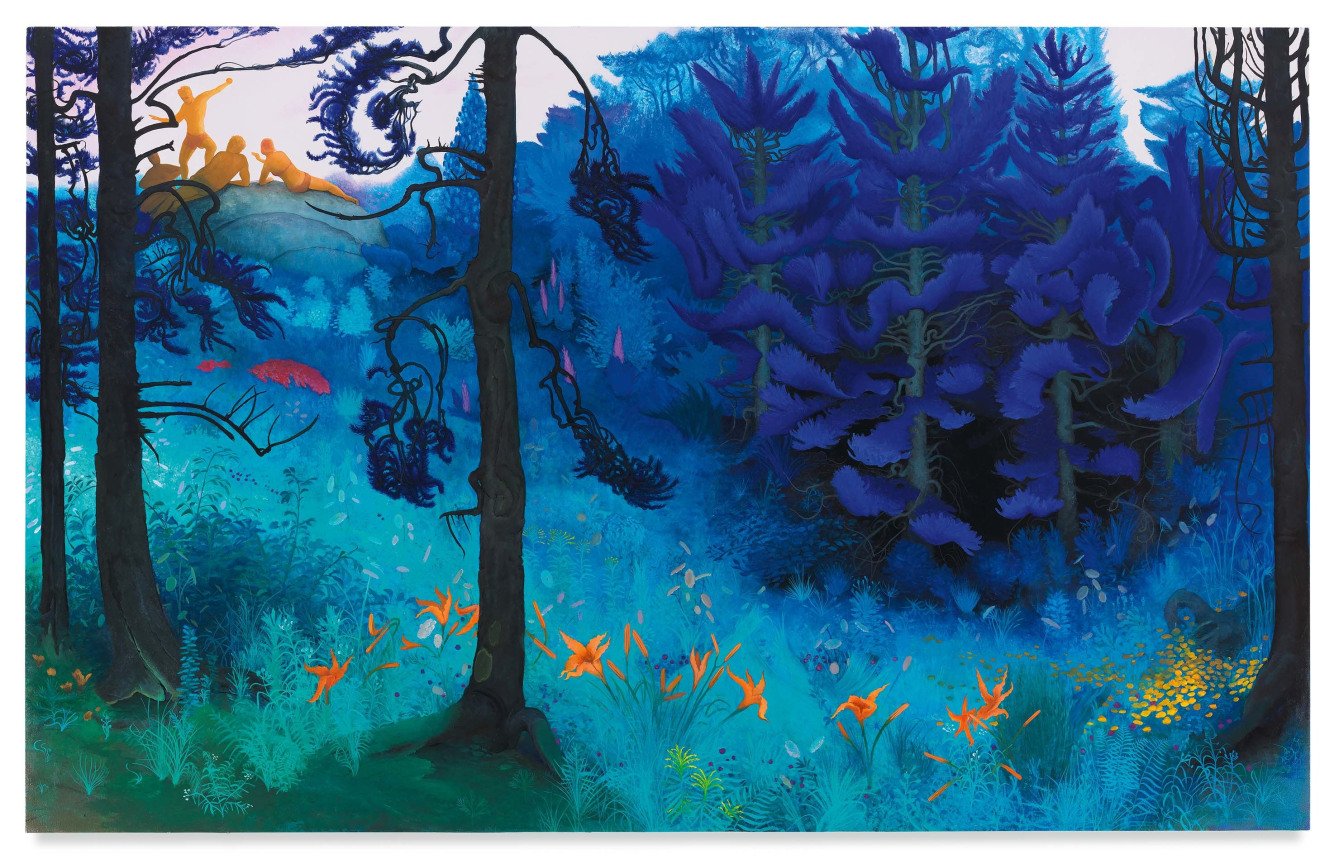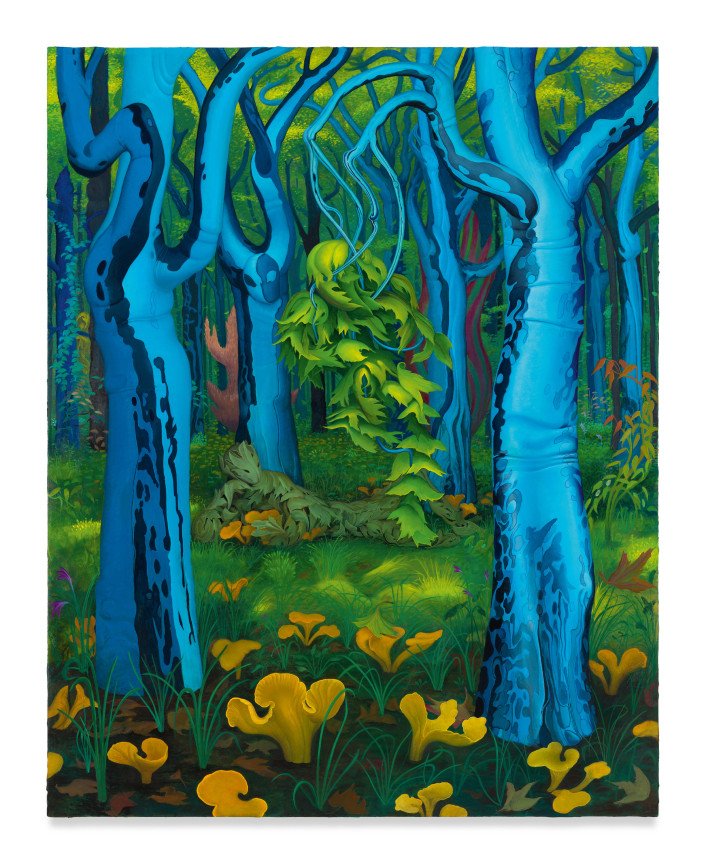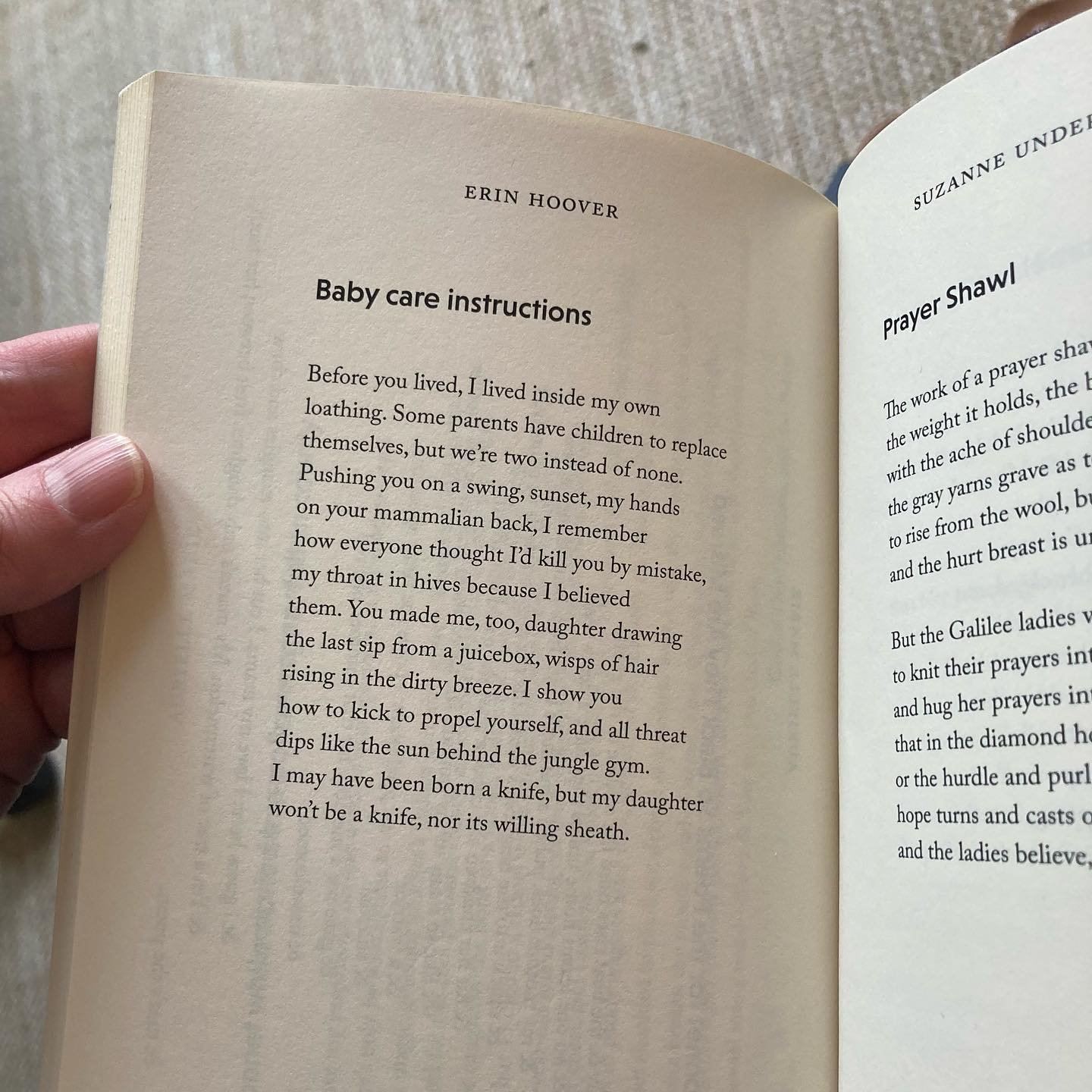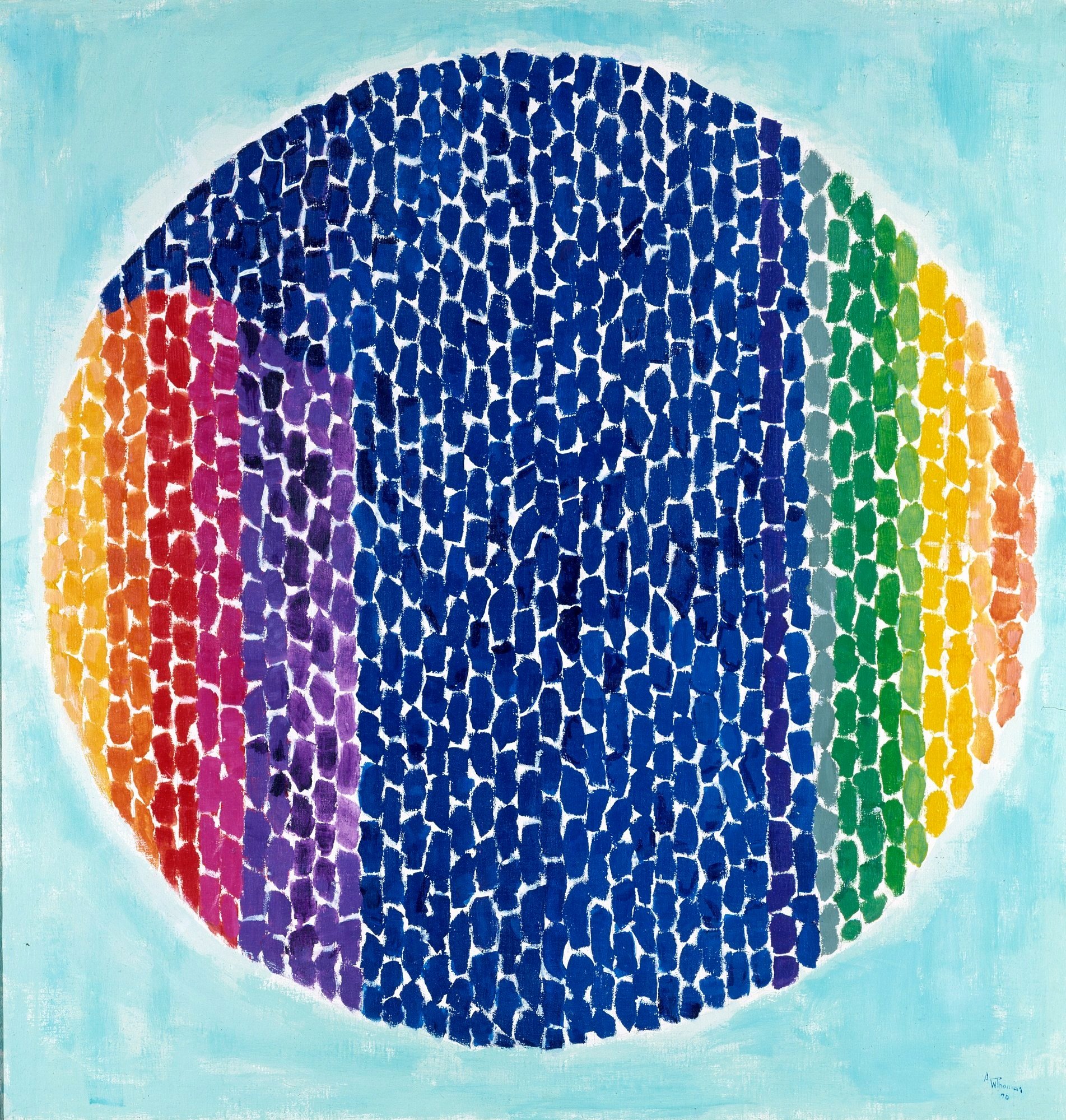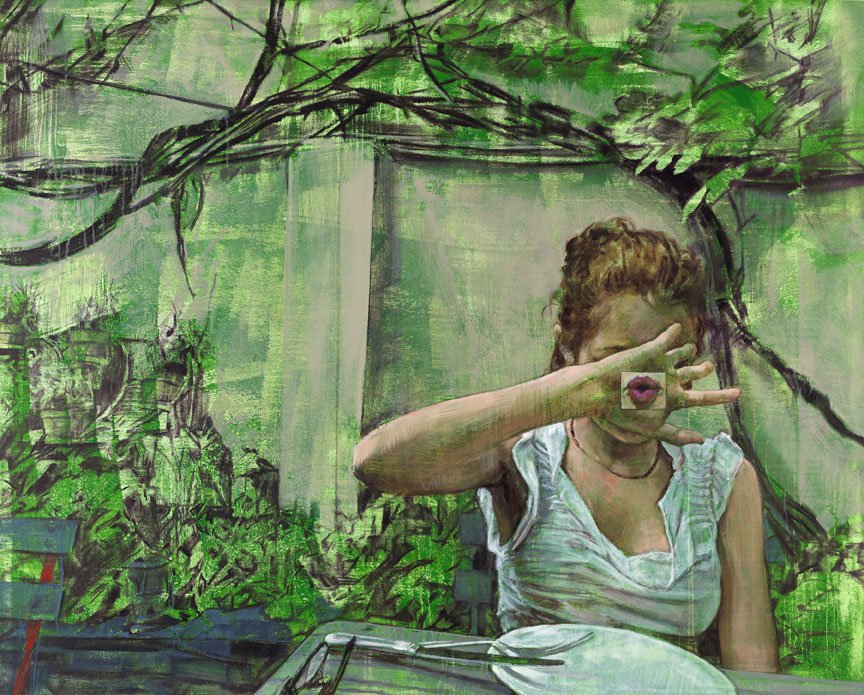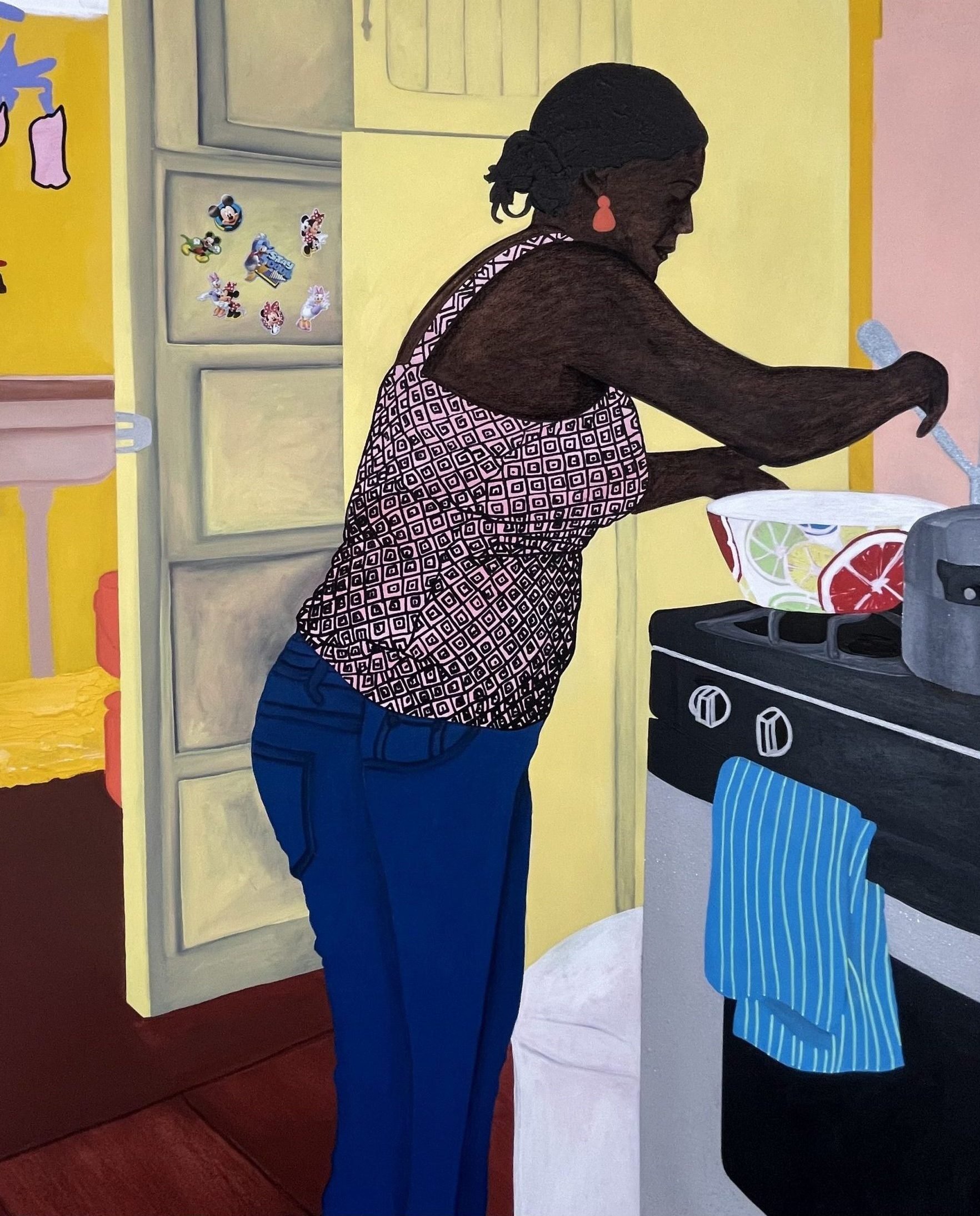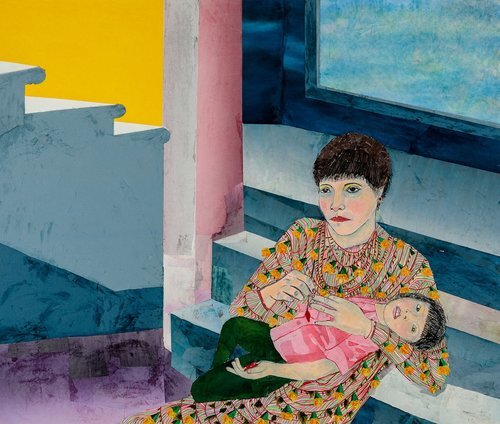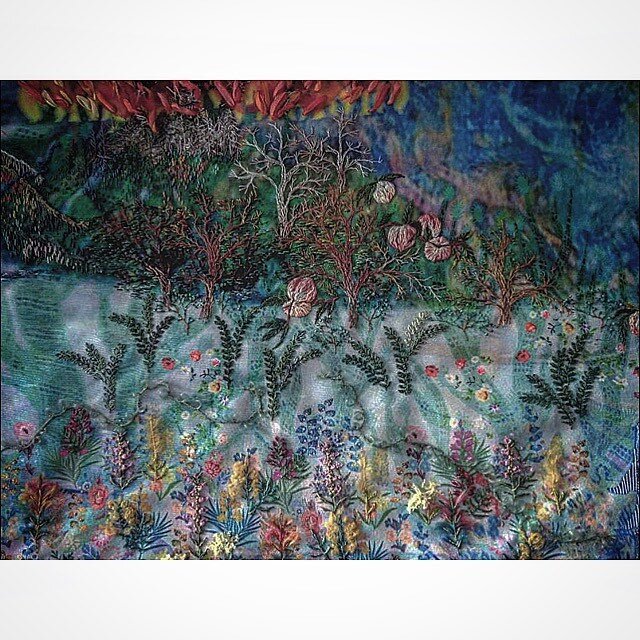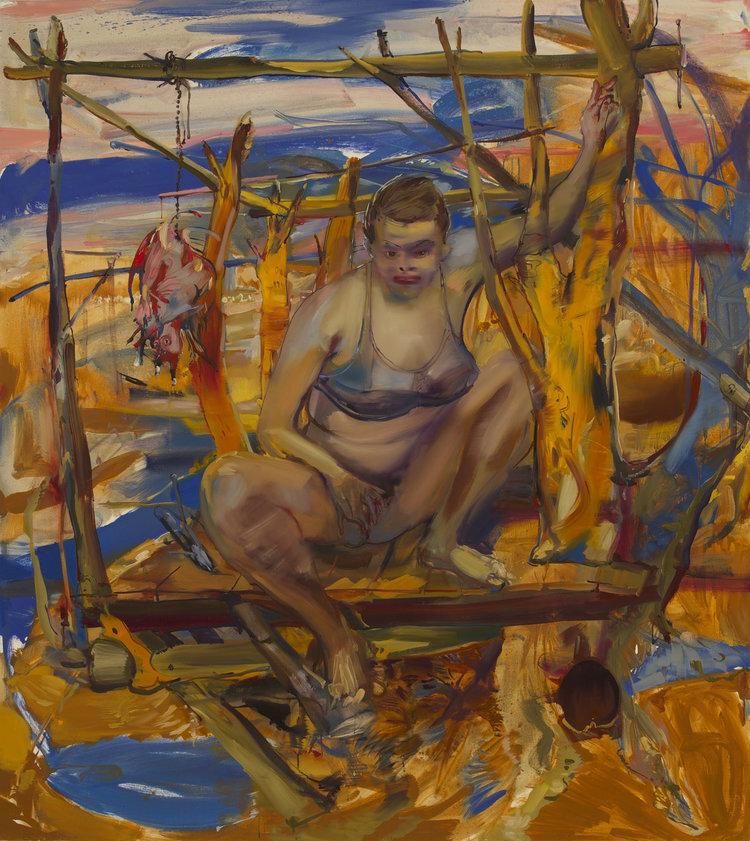This was truly a special event. Avni Vyas was amazing as always and the folks at Bookstore1 Sarasota (thanks Bryn Durgin!) and the Sarasota community made this book launch something extra fantastic.
AWP 2024 : Kansas City: In Parachutes Descending
In Parachutes Descending Launch Events!
Spring 2024 Featured Artist: Kandy G. Lopez
Melo 2022
yarn and spray paint on mesh canvas
60 x 60 in
Kandy G. Lopez
is amazing! Who knew yarn could be so vibrant and human?
As Lopez contends in her artist statement, it is all about the people:
“As an Afro-Caribbean visual artist, I am eager to be challenged materialistically and metaphorically when representing marginalized individuals that inspire and move me. My works are created out of the necessity to learn something new about my people and culture. I am interested in developing a nostalgic dialogue between the artwork and the viewer. If I’m not learning from my materials and how it affects the message, it's not worth creating.”
Kandy G. Lopez was born in New Jersey and moved with her family to Florida. She received her BFA and BS from the University of South Florida, concentrating in Painting and in Marketing and Management. She received her MFA with a concentration in Painting from Florida Atlantic University in 2014. She has taught at Florida Atlantic University, Daytona State College, and is now teaching as an Associate Professor in the Department of Communication, Media and Arts at the Halmos College of Art & Sciences at NOVA Southeastern University.
Lamenting Niki 2023 (above)
Yarn and acrylic paint on mesh canvas
50 x 60 in
Quavia 2023 (left)
Yarn and acrylic paint on mesh canvas
60 x 50 in
Sue 2021
Yarn and acrylic on mesh canvas
96 x 48 in
From an interview with Lopez on WYNC:
“I started playing around in 2016. I made really small ones. I tell people all the time, things happen in the studio by accident but also on purpose, like there's happy accidents. I like to coin that from Bob Ross. A piece of string fell on one of my prints. I was collaging at that time, and instead of drawing in power lines because I was really interested in cityscapes of these neighborhoods that don't have the resources or eventually people come in and then they gentrify them.
The string fell, and I was like, "Oh, I could just make power lines with thread," and then that turned into, "Well, I could make people from thread to see what they look like." I left that alone for a while, and I went back to painting and then I got pregnant. I was like, "Well, I can't paint my gigantic oil paints of these people anymore, so I did dabble in thread. Let's see what that can look like." That was one of the mediums where I felt like it made sense because it's fibers, like fibers of our being. It's also soft. I'm making these people look or they are confident but also vulnerable at the same time. Those are the two things that I really enjoy about painting minorities because they have that in them.”
Lori Ann 2023
Yarn and spray paint on plastic canvas
A Poem and A Piece
Late 2023 is flush with publications! “Letter to Those Who Wanted Me”—one of my favorite poems from In Parachutes Descending—appeared in the winter edition of the Colorado Review. You can read it here.
My article "Better Medicine: Shared Suffering and Chronic Vulnerability in Brian Teare's The Empty Form Goes All the Way to Heaven" also made its way to the most recent issue of Literature and Medicine.
A posthumanist understanding of the body does not view "illness" and "health" as properties of the individual body, but as emergent features of the relationships between bodies. As such, a relational view of health opens up avenues for the betterment of both human bodies and their social and physical environments. Drawing on posthumanism and the ethics of vulnerability, this article demonstrates how Brian Teare's The Empty Form Goes All the Way to Heaven (2015) provides a different way of thinking (and doing) illness, death, and vulnerability. With his acceptance and promotion of the body's dynamic materiality and chronic vulnerability, Teare advances a posthuman ethics based on our shared embodied condition.
Parachutes in Sarasota: January 28th!
In Parachutes Descending
Huzzah! The cover for IN PARACHUTES DESCENDING is here! Many thanks to Grace Mikell Ramsey for the use of her incredible painting. And endless gratitude to Alex Wolfe @Pitt Poetry Series for the splendid design. It’s perfect for a book of poems that has been described as “floating between fact and possibility, destruction and passion, introspection and challenge.” (Thanks Lauren Russell!)
You can pre-order, if you dare: https://upittpress.org/books/9780822967200/
And see more from Grace Mikell Ramsey: https://www.gracemikellramsey.com/
Fall 2023 Featured Artist: Inka Essenhigh
Rave Scene 2022
enamel on canvas, 46 x 68 inches
Inka Essenhigh
I stumbled upon Inka Essenhigh a few weeks ago and was immediately drawn to the other-worldly quality of her art. I confess, I like to go places, especially those fantastical off-the-grid joints. Essenhigh’s micro-macrocosms are inviting because they offer a sense that things could be different. As reviewer Lilly Wei notes in a recent issue of Art & Antiques, “Her works are not escapist but about other possibilities, accompanied, at times, with a quiver of disquiet, as if she knows how fragile all this is, how fleeting.” I highly recommend Wei’s excellent overview of Essenhigh.
The vibrant colors, the curves, the parties…
Blue Spruce 2020
enamel on canvas, 50 x 80 inches
Born in Bellefonte, Pennsylvania, Inka Essenhigh received her Master of Fine Arts from School of Visual Arts, New York, NY and her Bachelor of Fine Arts from Columbus College of Art & Design, Columbus, OH. She lives and works in New York, NY.
Purple Pods 2019
enamel on canvas, 34 x 32 inches
from the Miles McEnery Gallery:
“As found throughout Surrealism and other modern avant-garde movements, Essenhigh’s paintings tend be uniquely episodic, while still sharing themes of flora and fauna. They are touched by a curious self-containment and an interiority of the force of imagination. Her works display dimensional narratives that require close-up viewing, creating a visceral dialogue, one viewer at a time. Each is marked by bright, rich color, and a decision to revel in the “little world” schema of psychology with a fluidity between people and their things.”
Forever Young 2020
enamel on canvas, 60 x 42 inches
Blue Sycamore 2023
enamel on canvas, 68 x 54 inches
“Baby Care Instructions” — Erin Hoover
"Baby care instructions" by Erin Hoover is the first sonnet I've absolutely loved in a long time. It's in the new anthology Mid/South Sonnets from Belle Point Press.
Spring/Summer 2023 Featured Artist: Alma Thomas
Apollo 12 Splash Down 1970
acrylic and graphite on canvas
Alma Thomas
My son Berkeley, who loves all things rainbow, recently introduced me to the art of Alma Thomas (1891-1978)—which provides a dose of the bright and sunny we all need right now. Her art fantastically appeals to many of Berkeley’s loves: rainbows, patterns, space, Snoopy. Inspired by NASA’s Apollo program, Thomas made several “space” paintings in the early 70s, including the Snoopy series: “Snoopy Gets a Glimpse of Mars,” “Snoopy’s Vision of Mars,” “Snoopy Sees Earth Wrapped in Sunset,” and “Snoopy—Early Sun Display on Earth.”
Born in Columbus, GA, Thomas lived and worked in Washington D.C. where she taught art at Shaw Junior High for 35 years. When she retired in 1960, at the age of 68, she was finally able to devote herself to her practice full time. In 1972, Thomas became the first African American woman to have a solo exhibition at the Whitney Museum. Thanks in part to this exhibition, Thomas’s work was acquired by a number of major American museums.
Snoopy—Early Sun Display on Earth 1970
acrylic on canvas
The Philips Collection provides an excellent interactive tour of the exhibit Everything Is Beautiful, along with videos and information about Thomas.
I also recommend this article on CultureType: “50 Years Ago, Alma Thomas Made Space Paintings that Imagined the Moon and Mars”
Art by Berkeley Oden Zissou Welch, age 5 (Inspired by Alma Thomas)
Atmospheric Effects I 1970
acrylic and pencil on paper
The Eclipse 1970
acrylic on canvas
Sleeping With Jane: In Parachutes Descending
Happy to have a new poem in the latest issue of North American Review. And double extra bonus: it is full of some really amazing art! Especially the embroidery by Angie Hall Anderson and textile work of Hannah Gebhart.
“Sleeping with Jane” will also appear in my forthcoming poetry collection, In Parachutes Descending, to be published in Spring 2024 with University of Pittsburgh Press.
The Hate U Give: Commentary in Academic Medicine
A bit late with this, but my commentary on using Angie Thomas’s novel The Hate U Give to educate future physicians on anti-racism appeared in Academic Medicine 97 (7).
Fall 2022 Featured Artist: Laura Karetzky
Embedded Mid Drift 2019
oil on wood, 48 x 60 inches
Laura Karetzky
I find myself drawn to Karetzky’s work for many reasons—the monochromatic palette, the peephole nature of perspective portrayed, the intimate (but not) subject matter. All of these appeal greatly, but if I had to pick one thing, it would be the texture. While I haven’t seen any of her paintings in person, the digital images undoubtedly affirm scratches, streaks, drips, and chisels—a quality that, for whatever reason, makes me feel drawn into another reality. And perhaps that is the point, to visit someone else’s reality. As Emily Capone notes in her review of Karetzky’s 2021 Concurrence exhibition:
“Karetzky’s choice and application of her medium is purposeful. Each layer has a reason. The primed wood and textured backgrounds insinuate a history of use, much like finger streaks on a window or a tablet screen, while the layer itself is the first “window.” The actual windows evoke the physical engagement of the viewer, whether through a genuine representation in real time or through a time capsule. This hybridization is something Karetzky touches on with paintings such as Teal Text and Remote Screen. The play on words and the literal juxtaposition of the teal window on a digital screen is a stark contrast to the reflections through a mirror in Green Key or Points and Palms.”
Points And Palms 2022
oil on panel, 60 x 48 in
Laura Karetzky received her BFA from Carnegie-Mellon University, an MFA from The New York Academy of Art, and engaged in additional training at the School of Visual Arts, The New York Studio School, the Rhode Island School of Design, as well as extensive study in Florence, Italy. She is the recipient of several awards and fellowships including 2021 New York Studio School Artcritial Prize; 2020 New York Studio School Mercedes Matter Award; 2017 ESKFF Mana Contemporary Residency; 2014 Milton and Sally Michel Avery endowed Fellowship at Yaddo; 2011 Yaddo Fellowship; and 2009 New York Academy of Art Eric Fischl Award of Distinction. Laura Karetzky lives and works in Brooklyn, NY.
from the Luis De Jesus gallery:
”For many years, Laura Karetzky has been interested in the effect that communicating, specifically through technological means, has on perception. Since the pandemic, we have relied substantially on live-media platforms to perform our daily functions, and now we appear to be stuck somewhere between the real and virtual – a hybridization of witnessing the world, both in and around us.
The phenomenon of being inside our bodies and outside, on other screens, in other windows, and in other places, has changed our understanding of space forever as the boundaries of each are merging. This has led Karetzky to question the images she sees in every aspect of her visual field. With this body of work, she addresses the story inside another story, a window in a window so to speak, superimposed or inherently found; life reinstated inside itself.”
Stripped 2021
oil on wood, 30″ x 24″
Toast 2019
oil on panel, 48” x 60”
Spring-Summer 2022 Featured Artist: Tiffany Alfonseca
Alfonseca Rondon 2021
Acrylic, color pencil, glitter on canvas, 72 x 60 inches
Tiffany Alfonseca (b. 1994) is a Bronx- based Dominican-American mixed media artist who creates vibrant and colorful artworks that celebrates Black and Afro-Latinx diasporic culture. Alfonseca continuously taps into her Afro-Dominican roots and leverages it as a conceptual cantilever that provides a dynamic framework for her artistic practice. Moreover, her work aims to visually articulate that the Black and Afro-Latinx diaspora does not exist within a monolith, but that these communities are a cultural cornucopia that is vast, varied, and complex. Alfonseca’s artwork is an intricate combination of beauty, diversity, and multilingualism that exemplifies the strength of the Black and Afro-Latinx diaspora. (from tiffanyalfonseca.com)
As a mixed media artist, Alfonseca combines acrylic paint, charcoal, and glitter for her creations, breathing life into the two-dimensional art form through texture and depth. She draws inspiration from her own background and themes present in her culture, often depicting her loved ones and objects reminiscent of her childhood. By mixing patterns, colors, and mediums, Tiffany manages to brighten those quotidian tasks like bathing or folding laundry. (from LATINA)
Alfonseca presented her first solo exhibition, De Las Manos Que Nos Crearon, in Fall 2021 at The Mistake Room.
Romi 2021
Acrylic paint, charcoal, stickers, and glitter on stretched canvas, 48x60 inches
“In the Dominican Republic it’s normal to have a trabajadora in your home, and Romi happens to be my aunt’s trabajadora for years now. Every summer that I would go back to the Dominican Republic, she would always be there to welcome me with open arms.” - Tiffany Alfonseca
Esta vez sera diferente 2020
Acrylic paint, charcoal, and glitter on stretched canvas // 30×40 inches
”For me this piece is a representation of Black and brown queer love, depicting how being queer can be challenging in the Latinx community and culture. ‘Esta vez sera diferente’ stems from wanting to change the narrative of forbidden queer love and embracing it instead in the Latinx culture.” - Tiffany Alfonseca
Summer-Fall 2021 Featured Artist: María Berrío
Oda a la Esperanza (Ode to Hope) 2019
collage with Japanese paper and watercolor paint on canvas, 92 x 118 inches
María Berrío
I recently discovered the vibrant work of María Berrío through this Hyperallergic review entitled: “‘These Are the Women I Want to Be’: María Berrío’s Visions of Displacement.” Inspired by Latin American Realism, narratives of displacement, and the nonhuman environment, Berrío creates giant collages using watercolor and decorative paper sourced from Japan and elsewhere.
María Berrío (b. 1982) was born and raised in Bogotá, Colombia, and spent much of her childhood living on her family’s mountainside farm where she developed a unique and lasting connection to nature. At eighteen Berrío relocated to New York and received her BFA at Parsons School of Design in 2004, followed by her MFA at the School of Visual Arts in 2007.
Berrío describes the women in her work thus: “They are embodied ideals of femininity. The ghostly pallor of their skin suggests an otherworldliness; they appear to be more spirit that flesh. These are the women I want to be: strong, vulnerable, compassionate, courageous, and in harmony with themselves and nature. They combine the elements of women who are typically thought of as powerful – the captains of industry, resolute politicians, fiery activists – with the traits of those who are not usually thought of as such, thereby underlining the common force found in all women. The female soldier fighting on the front lines is of interest, but so too is the mother who finds a way to feed her children and sing them to sleep amid bombing campaigns and in the ruins of cities. To truly ennoble womanhood, we must discover and appreciate the beauty in every action, big or small.”
Genipa 2019
collage with Japanese paper and watercolor paint on canvas, 60 x 72 inches
Cricket Song 2017
Japanese paper on canvas
The Dream of Flight 2019
collage with Japanese paper and watercolor paint on canvas, 60 x 72 inches
Spring 2021 Featured Artist: Asami Kiyokawa
Greed
from the Complex Series: 2007 photo, thread, beads
Asami Kiyokawa
Asami Kiyokawa was born in Awaji Island, Japan in 1980. She held her first solo exhibition in 2001 and in 2011 became the youngest artist to hold a solo exhibition at Mito Art Tower. Asami is an embroidery artist who uses a needle and thread—along with other materials—to overlay an imaginative new world onto her photographs.
The image above comes from Kiyokawa’s “Complex Series,” of which her website notes: “Probably everyone has a complex of some sort. Something that attracts our concern, causes us to worry, and triggers our efforts to overcome it. Kiyokawa felt that way when she was working as a model. Eventually, she came to realize that her complex could become her originality, or her own distinctive quality. For this series, the artist took a number of photographs of the same model, and used them as the base for work on the theme of typical complexes that trouble women.”
I wasn’t able to obtain copies of the pieces I most admire, so I highly recommend exploring Kiyokawa’s website. I am especially fond of the “Mythology” series.
The images that follow are pulled from Kiyokawa’s social media account.
Fall 2020 Featured Artist: Felicia Van Bork
I believe I must be painting this way because I am in revolt against the unconsidered opinions expressed by people in the news these days. There is an aching need for empathy and tenderness in the world and I am teaching myself these things as fast as I can. —Felicia van Bork, March 28, 2020
Comment 17
2019, oil on canvas, 14 x 11 in.
Felicia Van Bork
Born in Toronto, Canada, Felicia van Bork completed her undergraduate studies at the Ontario College of Art and Design University and earned her MFA at the Massachusetts College of Art and Design at the Fine Arts Work Center, Provincetown, MA.
The artist's paintings and collages are widely collected in the United States and Canada and Felicia has been the recipient of numerous residency fellowships, including from the Virginia Center for the Creative Arts and McColl Center for Art + Innovation, where she manages the printmaking studio. In the summer of 2017, she was a Visiting Artist at the American Academy in Rome.
But what I really love is her series of How To collages…
How to Turn the Moon
2014, collage on panel, 36 x 36 in.
How to Beckon
2015, collage on panel, 36 x 36 in.
Watch Felicia van Bork discuss her collage process!
How to Divide and Multiply
2015, collage on panel, 36 x 36 in.
Recommended Reading: Lauren Russell's Descent
Lauren Russell’s Descent came out from Tarpaulin Sky Press last month—a gorgeous hybrid book that I count among the best recent poetry collections.
From Tarpaulin Sky:
In 2013, poet Lauren Russell acquired a copy of the diary of her great-great-grandfather, Robert Wallace Hubert, a Captain in the Confederate Army. After his return from the Civil War, he fathered twenty children by three of his former slaves. One of those children was the poet’s great-grandmother. Through several years of research, Russell would seek the words to fill the diary’s omissions and to imagine the voice of her great-great-grandmother, Peggy Hubert, a black woman silenced by history. The result is a hybrid work of verse, prose, images and documents that traverses centuries as the past bleeds into the present.
Read this great Poets & Writers interview with Lauren (in which I get a little shout out).
An Introduction to Seasteading
I’m pleased to announce the publication of my first “long” poem (the long ones are always so hard to place!). If you want to know more about the Seasteading movement, visit Pleiades Volume 40 . This six-page poem appears alongside a really cool poetic celebration of the periodic table. You can also read “Seasteading” here.
Spring 2020 Featured Artist: Angela Dufresne
The Lonely are the Brave
2018, 48 x 62 inches, oil on canvas
Angela Dufresne
Angela Dufresne is a painter, teacher and occasional writer who has shown her work in the U.S. and Europe since 1993. She has been the subject of twenty-three solo exhibitions and participated in over 100 group shows. Dufresne’s “work articulates non-paranoid, porous ways of being in a world fraught by fear, power and possession. Through painting, drawing and performative works, she wields heterotopic narratives that are both non hierarchical and perverse” (angeladufresne.org).
Maritza Ranero or Kiss the Cunt of God
2018, 72 x 66 Inches, oil on canvas
Dufresne’s paintings exuberantly weave imagery, narrative, paint, and visceral pleasure. She refers to the work as examples of non-paranoid, porous ways of being in the world. Delivered with absurdity, affection and feminist vibrato, Dufresne presents figurative articulations that feverously emerge out of the paint. Humorous, giddy, vulnerable, non-heroic, perverse, her figures revel in their destabilized relationship to their environments. Her subjects are nether man nor nature, form or formless, but allow for both to coexist in their lack of selfhood and their openness to absorb, fuse with, metabolize the world around them. In cinematic dissolves they conjure up the centrality, the ontology of humanity, as challenged. Deft in techniques of revision, erasure, overlay and addition, Dufresne deploys empathy and humor with equal parts skill and sensitivity in a commitment to painting’s ability to present, transgress and reconfigure experience and representation. (Guggenheim Foundation)
Perfect In Every way Except No Nose
2013, oil on canvas, 24 x 28 inches
See Hyperallergic for more on Dufresne:
”Beer with a Painter: Angela Dufresne”
”Angela Dufresne Queers the Portraiture Tradition”









